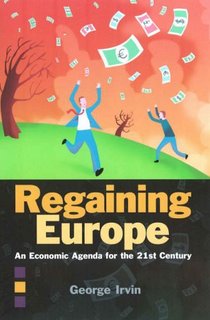A while before the latest Hirsi Ali hype broke loose, Christopher Hitchens started his wooing of the Caged Virgin in a weekly "Slate" Column. I
commented on that on this blog. Comments that had some echo in different places in the Blogosphere.
My point of view was, and is, that Hitchens was preparing a new use for the 'Moor' ('The Moor has done his job, the Moor may dispose!' - Fr. Schiller, famous German author, friend of Goethe), after her uses had been exhausted by the Dutch VVD conservative party.
And I also foresaw a new element in the Hirsi-Ali exploitation, to be expected from the American neoconservatives: putting her forward as a witness for the European softness and
dangerous appeasement leanings, concerning the
Great Muslim Conspiracy, that is a mortal danger to this world.
Now, in his latest
column, 'Holland's latest insult to Ayaan Hirsi Ali', he cashes in his gains like a card player who won too early, to much. The Dutch have served him all he hoped for, on a silver plate. He correctly feels, that, like in 'religious sects', or in prison (or, for that matter the Trotskyist sects, which he knows better), the leadership doesn't accept a voluntary good-bye: the dissenting and onerous member has to be evicted before he or she leaves freely. That is, what former prison warden immigration minister Rita Verdonk, cerberus hound against refugees and immigration, last Monday tried to do.
His only problem is, that he did not win
where he intended to, i.e.: at the cost of the Dutch and European
left. He won from another card-player, the Dutch (and European) populist and pro-Bush
RIGHT. Actually, those whom he (and Hirsi Ali for that matter) nails to the pillory as the willing collaborators of the Islam Conspiracy against the West, were the only ones, who timely and worthy protested against the methods and ways, the Dutch populist Right wanted to dispose of Hirsi Magan.
Look here:
 "Opnieuw gedwongen te vluchten" (Forced anew to fly) - manifesto of Dutch personalities*) against the right's handling of Hirsi Ali, NRC-Handelsblad, May 16, 2006. Click on the image to see a less unreadable version.
"Opnieuw gedwongen te vluchten" (Forced anew to fly) - manifesto of Dutch personalities*) against the right's handling of Hirsi Ali, NRC-Handelsblad, May 16, 2006. Click on the image to see a less unreadable version.On May 16, 2006, a group of Dutch LEFT-leaning intellectuals, writers, retired politicians, were the ONLY ones to come forward in an open letter in the most prestigious Dutch daily, NRC-Handelsblad, AGAINST driving out Ajaan Hirsi! This was published, BEFORE Parliament called minister Verdonk to order. At the same time, most of the political right was showing satisfaction at the disappearance of Hirsi Ali from the Dutch scene.
How does Hitchens handle this embarrassing anomaly?
He takes on the famous co-author
Ian Buruma (professor in the US, of Dutch origin) of "Occidentalism", who wrote an Op-Ed in The New York Times about Holland and Hirsi Ali. Rather timidly, Buruma made some critical observations on the ways in which the Dutch right has manipulated Hirsi Ali during her participation in Dutch politics.
Hitchens:
Writing in the New York Times last Friday, Ian Buruma said that Ayaan Hirsi Ali ought to have spoken out more for those who had been denied asylum in the Netherlands. (He is the author of a forthcoming book about the murder of Theo van Gogh, who was Hirsi Ali's partner in the making of a film about the maltreatment of women in the Muslim ghettos of Dutch cities.) This point doesn't seem to me to carry much weight. If she had become the spokeswoman for other refugees, her own story of making a partially false application could (and would) have been used against her even more. Instead, she pointed out that many perfectly legal immigrants to Holland were trying to import dictatorship rather than flee from it, and for this she attracted lethal hatred.
Without daring to do so explicitly, Hitchens categorizes Buruma with the naive lefties, who underestimate the Great Conspiracy and who condone "daily calls by imams in the country to join terrorism". The reason Hitchens gives for Hirsi Ali's systematic refusal to join the protests in the country against the immigration and deportation policies of her own party-representatives in Government, is too ridiculous for words: Hitchens himself mentions, that Hirsi Ali had, long ago, already "confessed" to have lied about her name and birthday, and why she did so. In standing up for people who did the same, there was no risk at all for her. No, Hirsi Ali did not defend the right to immigration for those who fly their countries for a valuable reason, because she is obsessed by the Islamic Conspiracy: a conspiracy of people who, with oil money, send agents to the country, not only in order to kill her, but also to take it over and install the sharia.
It is the Dutch and European RIGHT who abused, then chased, their Moor. The same people, who insist on joining Bush in his ways of dealing with Iraq and Afghanistan (Dutch troops to Helmand Province) are the ones who put the new Joan of Arc at the stake!
Hitchens won too quickly, and from the wrong player.
*) It may be interesting to see, who showed real (Dutch) courage and who refused to give a "Dutch fuck", at a moment it mattered most:
- Geert Mak, writer of a remarkable book on Europe (translated into many languages), co-author and initiator of the manifesto, is the much loathed and ridiculised author of two pamflets written after the murder of film-maker Van Gogh in 2004, in which he pleaded for a less hysterical and more dignified reaction to what happened. Right-leaning intellectuals, friends of Hirsi Ali, continue to attack him in the worst imaginable ways. They even invented a new verb in Dutch, "geertmakken", to describe the criminal way in which, in their opinion, writers and intellectuals like he, paved willingly the way for an islamic coup d'état. Amsterdam's jewish mayor, Job Cohen, another "geertmakker", who fights to keep the city's civic society together, is often accused of "dhimmy-ism".
- Ed van Thijn, former Amsterdam Mayor, former Minister of the Interior, prominent social-democratic thinker. Marginalised by the actual party-leadership.
- Hedy d'Ancona and Maarten Asscher: prominent members of the Amsterdam social-democratic liberal circles.
- Frits Barend, Martin Bril, Max Pam, Adelheid Roosen, Theodor Holman, Mieke van der Weij, Ciska Dresselhuys: Opinion-makers, columnists in mainstream papers. Holman, friend of Theo van Gogh, was and is utterly shocked by his death, leaned a long time towards the radical populist circles (Ephimenco, c.s.), but feels apparently more at home with these people he despised so much for their "weak" stand on Islam.
- H.M. van den Brink, Sybolt Noorda: Respected scientists.
- Connie Palmen: Writer and former judge, partner of former minister and founder of liberal party D66, Hans van Mierlo.
- Betsy Udink: Journalist and writer on Islamic societies, married to a Dutch diplomat, until recently stationed in Pakistan. Last year she published a very critical book on the Pakistani regime.
- Adriaan van Dis,Tilly Hermans, Freek en Hella de Jonge, Rudy Kousbroek, Jan Wolkers and Joost Zwagerman: Well-known writers and playwrights.










